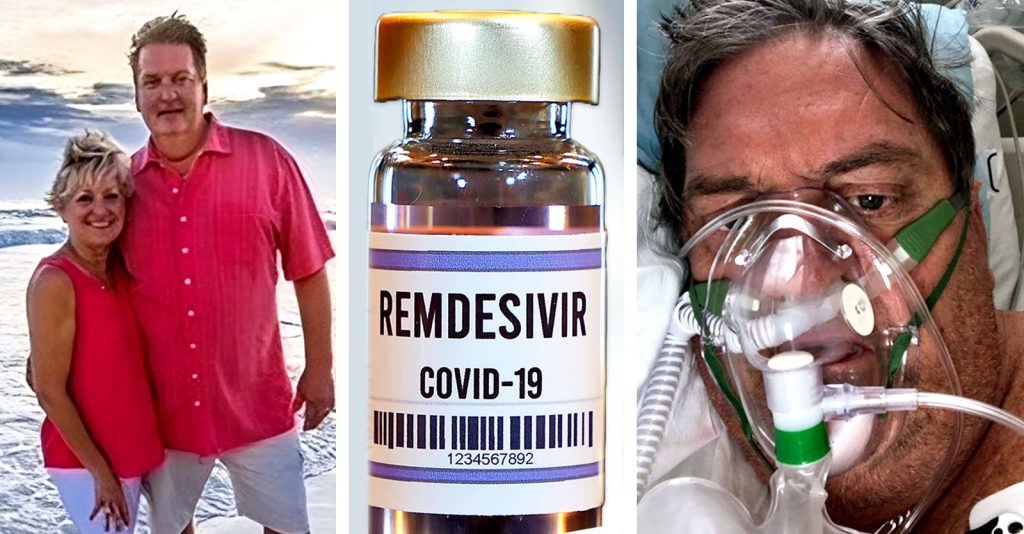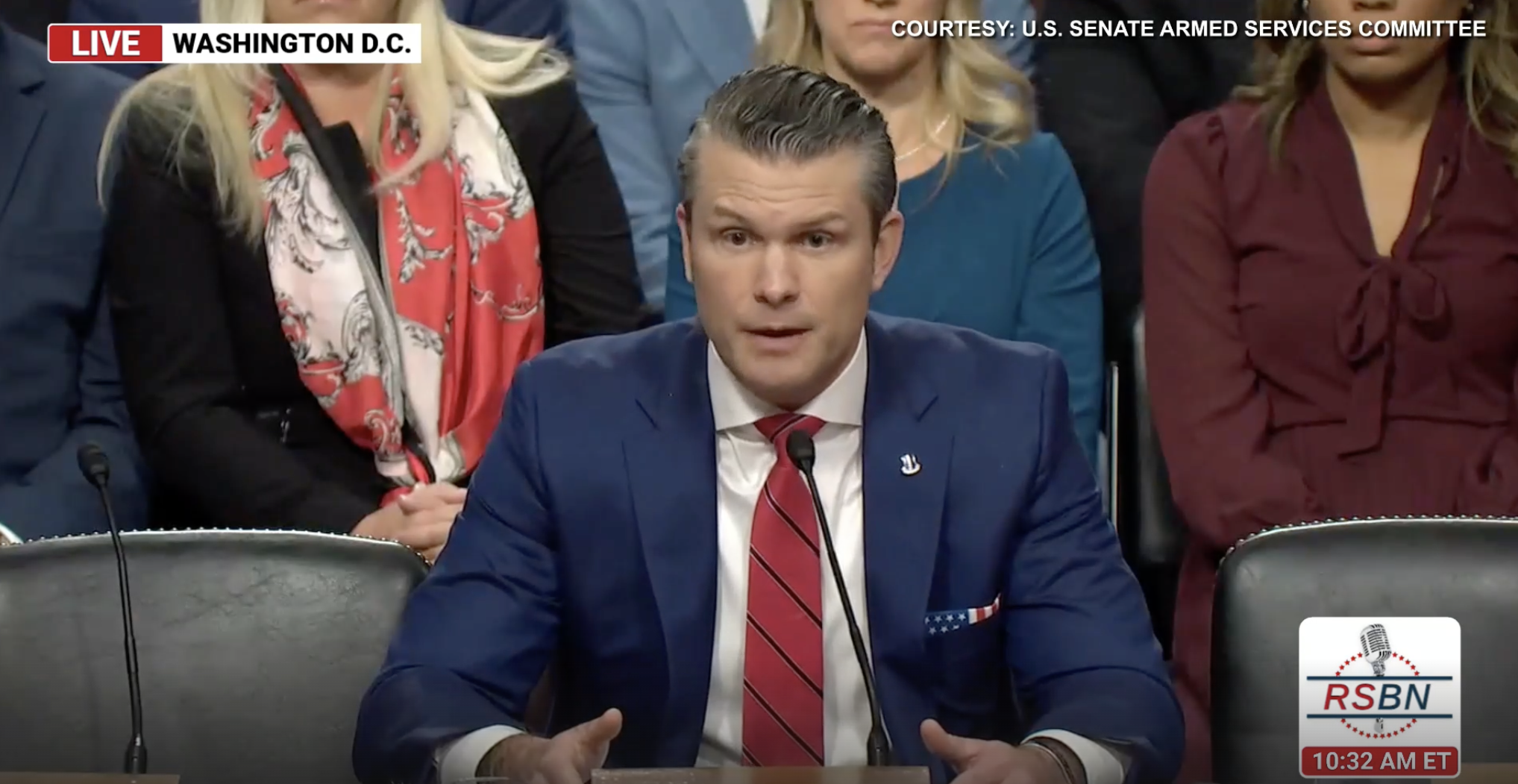Sharon Smith described the 39-day ordeal her husband, 61-year-old Jeffrey R. Smith, endured after he was hospitalized for minor COVID-19 symptoms. Smith said the hospital’s insistence on administering remdesivir and other drugs — and putting her husband on a ventilator — directly led to his death.

Please Follow us on Gab, Minds, Telegram, Rumble, GETTR, Truth Social, Twitter
In June 2021, 61-year-old Jeffrey R. Smith was healthy, active and enjoying his 42nd year of marriage to Sharon Smith. That same month, they both came down with COVID-19, but their symptoms were mild and there was little cause for concern.
When Jeffrey’s symptoms lingered just a bit longer than those of his wife, he visited an urgent care center.
That visit marked the beginning of a 39-day ordeal that resulted in his hospitalization, a loss of 47 pounds, and, ultimately, his death, on Aug. 11, 2021, at Mease Countryside Hospital in Safety Harbor, Florida.
Jeffrey’s cause of death was officially listed as COVID-19. But when Sharon examined his approximately 6,000 pages of medical records, she discovered he had sustained kidney damage, likely due to repeated doses of medications including remdesivir, a drug known to stop kidney function in patients.
Sharon also discovered that doctors at the hospital did not treat her husband’s pulmonary embolism — or blood clot — which he developed during his hospitalization. Instead, she alleges doctors insisted she allow him to be placed on a ventilator and that she sign a do not resuscitate (DNR) order for him.
In an interview with The Defender, Sharon said the treatment her husband received at the hospital was incentivized by the Centers for Disease Control and Prevention’s (CDC) COVID-19 hospital protocols — and by the fact that neither she nor her husband had received a COVID-19 vaccine.
Sharon shared extensive documentation with The Defender to corroborate her story.
‘NO AD’ subscription for CDM! Sign up here and support real investigative journalism and help save the republic!‘
‘He didn’t give his consent to anything’
On July 4, 2021, Sharon said she “just didn’t think my husband was breathing as deep as I was.” Out of concern, she recommended they visit a local urgent care center for a chest X-ray.
“When we went to urgent care and they checked his blood pressure, everything was normal,” Sharon said. However, the couple was sent to Mease Countryside Hospital for X-rays.
Sharon recalled that she could not stay at the hospital due to COVID-19 restrictions, but was told she could return in two hours to pick up her husband. However, about 30 minutes later, her husband called and said the hospital was going to keep him overnight.
“I said, why?” Sharon recalled. “He wasn’t struggling to breathe. … Blood pressure was good, temperature was good.” Despite this, Sharon was told that her husband was going to be kept “on a little oxygen.”
“What we didn’t know at the time was that they had given him two doses of remdesivir, and he didn’t give his consent to anything,” Sharon said. Doctors administered the two doses within three hours of admitting Jeffrey to the hospital.
He had a D-dimer test for pulmonary embolisms, and it was normal, Sharon said. “Everything was normal. He was so healthy going in. He took no medications, had no health issues at all. He walked three to six miles a week. We just had our checkup at the doctor. So, there was nothing there.”
Later that evening, Sharon said someone from the hospital called “in a panic, in the middle of the night … that they had to move Jeff up to the COVID ICU [intensive care unit] to just observe him a little bit more.”
The following day, Sharon said a doctor told Jeffrey that he was “probably going to have to go on the ventilator.” According to Sharon, when he asked why he had to be ventilated when he had come to the hospital for a chest X-ray — and mentioned that his wife would not agree to this — he was told “Well, your wife is going to have to like this or you’re going to die.”
“I said, ‘Oh my goodness, you’re not going to die.’ First of all, because we trusted the doctors, we trusted the hospital. We never in our wildest imaginations thought that you would go in for anything and they would try to harm you, but that’s exactly what they did,” Sharon told The Defender.
As time went on, the doctors gave him more and more oxygen, and more and more drugs, Sharon said, although she wasn’t informed about it. She only learned about the medications when she reviewed Jeffrey’s medical records after his death.
“The drugs that they were giving him … Precedex, propofol, fentanyl, midazolam … these are the drugs that they use to euthanize people,” Sharon said.
‘They stopped feeding him, giving him any kind of water, cleaning him’
Sharon said there were other examples of the hospital mistreating her husband.
“They stopped feeding him, giving him any kind of water, cleaning him,” she said, recalling that during a FaceTime conversation, he looked “awful.”
“I said, ‘Have you had a shower? Have they washed?’ He goes, ‘No, they haven’t.’ He looks awful. His hair’s a mess. He’s unshaven and he hasn’t had his bedding changed in a week. He hasn’t got any different clothes on,” Sharon recalled.
Her husband urged her not to make an issue of it, according to Sharon.
“When I would say something to the nurses, Jeff would say, ‘Sharon, don’t make waves, because they’re taking it out on me.’ And at the time, I didn’t understand. I didn’t think they were doing bad things, purposely doing bad things to him. I thought they were just being neglectful,” she said.
Sharon said it was difficult to speak to a doctor or to get authorization to visit Jeffrey.
“Every day I would say, I want the doctor to call me. The doctor would call me. Sometimes they were rude to me, sometimes they were short with me, some were OK.” She had to “plead” with a hospital administrator in one instance to be allowed a 15-minute visit.
“I got up there to see Jeff, and he was just a mess. I mean, they weren’t getting him out of the bed. He was just deteriorating in front of my eyes,” Sharon recalled.
On another occasion, Sharon said she was allowed a visit for “17 minutes, exactly” and was told she would soon be permitted daily visits. Later that day, Sharon called to check on Jeffrey and was told he was “relaxed and had some ice cream.”
A half-hour later, “I get a call from the hospital and it’s a panic … they said, ‘We’re going to put Jeff on the ventilator right now. He had a panic attack and his oxygen level dropped and he can’t get it back up, so we have to put him on the ventilator.’”
Sharon said she was offered the opportunity to speak with Jeffrey via FaceTime. “I got 20 seconds to see my husband’s face, and when I think back now, he wasn’t gasping for air or anything like that. He just looked scared.”
According to Sharon, she was told Jeffrey would be ventilated for three days “just to give his lungs a break.” Yet, “he was on the ventilator for 20 days after that” — until the day he died.
‘They yelled and screamed at me’
According to Sharon, the doctors repeatedly told her that as long as his kidneys weren’t involved, he would be OK. Yet, “as soon as he got on the ventilator, that’s when they said, ‘Oh, his kidneys are struggling.’ And that’s what remdesivir does.”
Jeffrey was placed on CRRT (continuous renal replacement therapy), a slow dialysis machine. This continued until Aug. 11, 2021, when Sharon remembered a doctor called her and said Jeffrey was “tolerating the CRRT really well” and that he would “try a couple different things” and call back.
“He called me back a couple hours later and said, ‘Jeff’s going to code out today,’” Sharon recalled. “I’m like, ‘a couple hours ago he was doing OK.’”
Sharon says she insisted on visiting her husband, but the doctor “fought” her on it, before relenting. When she did visit, hospital staff told her to “look through the glass” at her husband, before finally being allowed into the room “for two minutes.”
“When I came out, they started to pressure me to put a DNR on him, and I said, ‘I’m not putting a DNR on him.’ They kept pressuring me. I said, ‘my son and I are going to talk about it. We’ll call you back.’ We called them back and I said, ‘we’ve decided that we are not going to do that because if we do it then there is no hope,’” she said.
“They yelled and screamed at me on the phone, but I stuck to my guns,” Sharon recalled. “And a couple hours later, they called and said that Jeff had died.”
Blood clot, kidney troubles began after remdesivir administered
Sharon observed several abnormalities during her husband’s hospitalization and also when she reviewed his medical records.
“What I know now is that his D-dimer levels — and I have all the records to back this up — the evidence is that everything was in the normal range.”
She added:
“After the two doses of remdesivir in the hospital in the ER [emergency room], within three hours of being in the ER, that’s when he developed the blood clot. And they noted it. They were aware of it a couple of times. They noted it, but they didn’t do anything about it.
“The day after he had two doses of remdesivir … doctors noted that his D-dimer is now very elevated, which means you have a pulmonary embolism.”
“They did not treat it for two weeks, and they tested five times within that two-week period,” Sharon said, noting that Jeffrey “ended up having six doses of remdesivir.”
Sharon said Jeffrey was also administered a monoclonal antibody, “one dose to the tune of $27,000,” even though “it was already too late for that — you need to have that in the beginning. This was already 10 days in.”
Ultimately though, for Sharon, her husband’s fate rested on the lack of treatment for his blood clot.
“That’s where it started,” she said. “If they would have treated that blood clot on day one — because people have blood clots all the time — it’s something that you can fix … and send him home. But they didn’t choose to do that. It was like they had him and he was a cash cow for them,” she said, referring to the COVID-19 hospital protocols.
The protocols, prescribed by the CDC, are the subject of a white paper, “Follow the Money: Blood Money in U.S. Healthcare,” which found that the U.S. government incentivized hospitals under the CARES Act (Coronavirus Aid, Relief, and Economic Security Act) to administer treatments such as remdesivir to COVID-19 patients.
According to the report, the average per-person incentive in the U.S. for a “complex COVID inpatient” is $292,566. Hospitals received money for each COVID-19 admission, for the use of remdesivir and for placing patients on ventilators.
‘They were making an example’ of the unvaccinated
Sharon said she believes that Jeffrey’s treatment at the hospital was connected to his unvaccinated status.
“The first day that Jeff was there … the doctor called me and the first question she asked [was], ‘Why weren’t you guys vaccinated?’” Sharon recalled. “I said, ‘Well, because we chose not to be. We are healthy. And this vaccine came out awful fast and we didn’t have a good feeling about it.’”
“That is noted in Jeff’s records over and over and over, that he was not vaccinated or I wasn’t. And at the time that he was in the hospital, it was really when the vaccine was really being pushed out. Basically, they were making an example of the people that came in there that were not vaccinated,” Sharon said.
Sharon also noted that, at Mease Countryside Hospital, patients were being admitted with either an “unvaccinated” or “unknown” vaccination status, perhaps to conceal the number of COVID-19 cases among the vaccinated.
“I know that from a number of nurses that are whistleblowers, that have come out and said that there wasn’t a place to put if you were vaccinated,” Sharon said.
Sharon has since become involved with activist groups who have spoken out on behalf of hospital protocol victims, including the FormerFedsGroup Freedom Foundation and the COVID-19 Humanity Betrayal Memory Project (CHBMP), which developed a list of the 25 commonalities shared by most hospital protocol victims.
According to Sharon, “Of those 25, I think there’s two that didn’t happen” to Jeffrey, noting that her requests that ivermectin, hydroxychloroquine and vitamin D were refused, while vitamin C was administered only on the day of Jeffrey’s death.
“When you look through the drug list, you’ll see that that increased intensely as we got right to the end. He didn’t have a fighting chance,” Sharon said.
Sharon encouraged others who have lost a loved one at a hospital to a COVID-19 diagnosis to carefully check their medical records.
“People need to look at the death certificate. If it says ‘COVID,’ you need to get your medical records and have a doctor, have somebody that’s qualified to look at those records and go through them, just like I did. And they’re going to find that it’s probably not what they think. It’s much worse,” Sharon said.
She also encouraged victims and their families to speak out, noting that even a mere conversation with others can make a difference.
“There’s been many people that once you start to talk about it, then they go, ‘wait a minute.’ So, they start to connect the dots that this could have happened to their person,” Sharon said.
She added:
“There’s a couple of reasons why I fight this so much. One, because they took my husband away from me, and he wasn’t sick and he should never have died. But I’m thinking ahead for my children and my grandchildren. If we don’t stand up and fight for this right now and stop this, it’s going to continue, and we can’t have that. They have to be stopped.”
Michael Nevradakis, Ph.D., based in Athens, Greece, is a senior reporter for The Defender and part of the rotation of hosts for CHD.TV's "Good Morning CHD."
“© [Article Date] Children’s Health Defense, Inc. This work is reproduced and distributed with the permission of Children’s Health Defense, Inc. Want to learn more from Children’s Health Defense? Sign up for free news and updates from Robert F. Kennedy, Jr. and the Children’s Health Defense. Your donation will help to support us in our efforts.

























Please download the Death by hospital protocol app and include the names of the murderers, er "so called" doctors and nurses responsible. The world needs to know who they are!!!